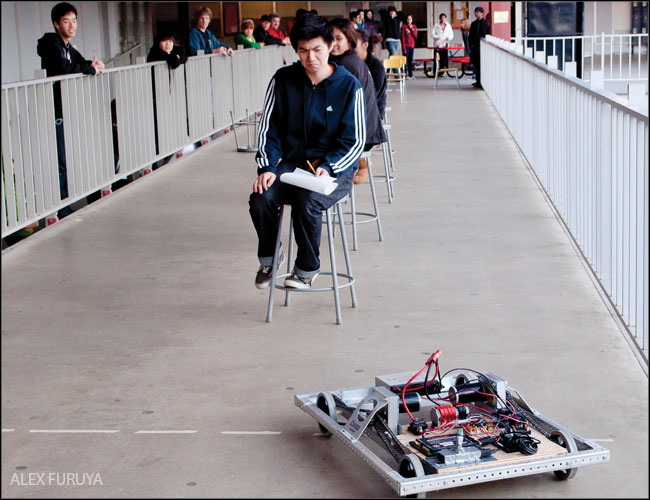
Following a challenging year away from competition, the Aragon Robotics Team has witnessed a wide arrange of changes as it gears up to compete in FIRST Robotics competitions. Along with a soaring membership of forty members and a new management system, the team has been engaged in an active season.
With physics teacher Steve Ratto currently serving as full-time club advisor, the robotics team has been able to continue competing in events held by the FIRST [For Inspiration and Recognition of Science and Technology] organization. Last year, the team chose not to participate in these competitions feeling that the team had not had enough experience to compete effectively.
The club is now resuming participation in the FIRST Robotics Competition. Furthermore, it is competing for the first time in the FIRST Technology Challenge this year. The club’s lead financial officer, senior Sophia Wu, says, “In the past, we’ve always done the robotics competition, but this year we’re also [starting] the technology challenge, which is smaller scale with each member contributing more.”
FIRST Technology Challenge is an small scale competition that emphasizes the technical aspects of robotics. Team sizes are capped; thus, each team member contributes more to the competition
FIRST Robotics Competition, on the other hand, emphasizes the mechanical aspect of robotics. It bears no cap on team size and has competitors build a larger robot. The ART has traditionally participated in this competition. The club’s mission statement declares the intention to regularly build a robot for the FIRST Robotics Competition.
Despite a year without competing, the team was able to perform well in a Nov. 20 qualifier event for the First Robotics Competition. The team ranked in the top four of the competition and placed as finalists for two awards.
The team members and mentors both express excitement towards competing again. Team captain, senior Anna Olson, says, “It is more of why would we not compete than why would we compete.”
Wu adds, “Competition is the culminating event of our year; we spend all our time preparing everything for competition. For me, it is not about winning awards, but [the] learning experiences than doing projects throughout the entire year.”
ART co-founder and team mentor Jeremy Leibs says, “I’m hoping they get the opportunity to find out about what they’re excited about, whether or not [they are] finding the best way to do the little details [in robotics]. After the competition you don’t remember that. You remember the excitement and opportunity to participate in this kind of event.
The team also grown much in size this year. 10 new members were taken in this year. Though team size was expected to shrink gradually throughout the year, the number has remained solidly at no fewer than forty members throughout the season. Team mentor Geary Chew says, “I’m surprised at how much the team has grown considering we didn’t compete last year.”
However, the larger team size does pose some minor problems for the team. Olson says, “[The] biggest challenge is with workspace and shopspace; maximum workspace in the shop is six to eight people. [Also], people get a little less hands-on experience because of the bigger pool.”
Besides changes in size and competition, ART has implemented a new leadership system. Veteran members felt that the executive council style of organization was not efficient and transparent. Wu says, “Only the top officers knew what was going on.”
The team met with team mentor George Wang, who gave advice on what values and qualities to facilitate for the redesign. Wang says,” I suggested what others organizations have as their structures; more flat with strong communication between all the people on the team. [However], my role as a mentor is more to provide options, but decisions ultimately lie with the team.”
The team decided on a more horizontally, as opposed to vertically integrated organization this year. Programming, electronics, engineering, public relations, multimedia, and finance lead positions were created in order to channel more guidance throughout the entire team.
All in all, the team has improved considerably in the first half of this school year. Chew says, “They are evolving for the good. I’m very proud of how they have matured over the years.”




